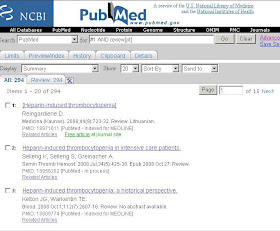Further restrictions were necessary in order to yield manageable results. There are a number of ways you could to this depending on the objectives of your search. The key to effective PubMed searching is to have the objectives clearly defined going in, as there are many distinct PubMed strategies. This will enable you to realize the power available with PubMed searching. Failure to do this will yield results that are next to useless.
If you want to narrow your results while maintaining a comprehensive listing of clinical articles on the general topic you can restrict the search to the human subjects field. You can probably narrow the search further while still being comprehensive by narrowing the dates. If your search is about a particular aspect of HIT you can add terms regarding that aspect.
Those are examples of just a couple of objectives. But suppose you just want a manageable number of review articles, preferably in mainstream English publications, for background reading. You proceed by sequentially adding restrictions until you reach an optimal number of hits. Here’s how it works.
The three terms, ANDed together with restrictions to the title field, yields 1364 hits (one additional citation has been added since we last tried!): (Click images to zoom).

PubMed saves each search query in its history for 8 hours of inactivity. You can view the search history by clicking the history tab. Search queries are designated by number. (This comes in very handy for some complex searches):

Now, to get started on that list of review articles, “AND” in with the three term query the term “review” restricted to the publication type field designated [pt]. The search terms could be typed in as: heparin[ti] AND induced[ti] AND thrombocytopenia[ti] AND review[pt]. Since the first three of those terms are bundled together as #1 in your search history you can just type #1 AND review[pt] as a new search:

You could have saved yourself the above step by just clicking on the review tab. That would have gotten you the same results but wouldn’t have saved the new search in the history. It’s useful to save search queries in the history as you go along.
We’re down to 294 hits---better but still a few too many. Now we’re going to narrow it down another notch by restricting the search to publications in English. Simply add English as a search term with restriction to the field “language”, [la]. Your combined search strategy to this point is bundled as #2 in the search history so you can just type #2 AND English[la]:

We’re down to 255. Still a ways to go for really useful results. The next step is to narrow down with in these results by adding a journal subset term to retrieve only those articles contained in more familiar “mainstream” journals. That term is jsubsetaim. The letters aim stand for “abridged index medicus.” The history page indicates that our most recent combined search query is #4 (don’t ask why it’s not #3) so we start a new search thusly: #4 AND jsubsetaim:
Now we have 40 hits. This is a manageable number, and so we’re through searching. PubMed links to the journal site for every citation so you can access the full text. Out of this list of 40 I was able to immediately access around 30 full text articles, either via an existing subscription or because the full text access is free, as it is for an increasing number of journals these days. Full text is what you’re really after if you want review articles for background reading. Abstracts are sufficient for certain other objectives. After a little practice I was able to conduct this type of search in a couple of minutes. Now tell me PubMed isn’t cool!

Dr. R.W.;
ReplyDeleteJust wondering if you're aware that most of the tabs (Limits, History, etc.) will be going away this summer, and all those things will be under Advanced Search.
Here are a couple of good rundowns:
http://kraftylibrarian.com/2009/03/changes-to-pubmed-soon.html
http://liblog.mayo.edu/2009/03/04/pubmed-advanced-search-an-introduction/
And now, you can set a customized search filter that would encompass all three of your limiters: Review, English, and jsubsetaim. If you do that, then all you need do is enter your terms & run the search -- your filter would already be in place. Very easy! See the NLM Technical Bulletin for information on how to make a customized search filter at http://www.nlm.nih.gov/pubs/techbull/mj09/mj09_pm_myncbi_collections.html
ReplyDeleteRT@ LibrarianGMIT: New useful search engine that returns full PDF scientific articles not subject to access fees: http://www.freefullpdf.com
ReplyDelete